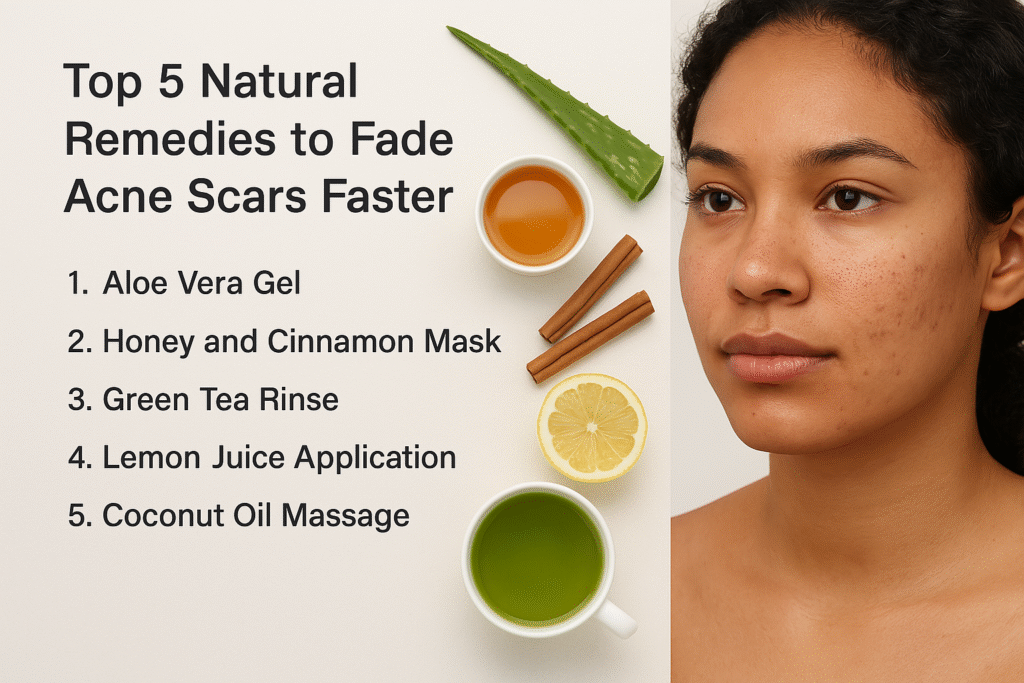Acne scars can linger long after breakouts clear, leaving uneven texture, dark spots, or depressions that affect confidence. While professional treatments exist, simple home remedies harness nature’s healing ingredients to gradually lighten scars without harsh chemicals. Consistency is key—apply these gentle treatments several times a week and protect your skin to see lasting improvement.
How Acne Scars Form
Scarring happens when inflammation from a pimple damages collagen in the skin. The body repairs the injury by overproducing or underproducing collagen, resulting in raised (hypertrophic or keloid) or indented (atrophic) scars. Post-inflammatory hyperpigmentation (PIH) appears as flat, dark spots when melanin overproduces in response to inflamed acne.
1. Aloe Vera Gel
Aloe vera is prized for its soothing, anti-inflammatory properties and rich mucilage that hydrates healing skin. Its natural compounds—like polysaccharides—promote collagen synthesis and cell turnover, helping scars fade while reducing redness. To use, extract fresh gel from an aloe leaf and apply directly to scarred areas twice daily, leaving it on for at least 30 minutes before rinsing.
2. Honey and Cinnamon Mask
Honey is a natural antibacterial and antioxidant, while cinnamon improves circulation and exfoliates dead skin cells. Together, they create a potent scar-fading mask:
- Mix 1 tablespoon raw honey with ½ teaspoon ground cinnamon.
- Apply to scarred or pigmented areas and leave on for 15–20 minutes.
- Rinse with warm water and pat dry.
Use this mask 2–3 times per week for noticeable brightening and smoother texture.
3. Green Tea Rinse
Rich in polyphenols, green tea offers antimicrobial and anti-inflammatory benefits that prevent further breakouts and soothe existing scars. The catechins inhibit bacterial growth and calm irritated skin. To make a rinse:
- Brew a cup of green tea, then let it cool completely.
- Use a cotton pad to apply the tea to scarred areas or spritz it on with a spray bottle.
- Leave it on—no need to rinse—and follow with your regular moisturizer.
For best results, incorporate this rinse into your nightly routine.
4. Lemon Juice Application
Lemon juice’s natural vitamin C and citric acid act as gentle chemical exfoliants and brightening agents. They help break down excess melanin and promote cell renewal. Dab fresh lemon juice onto dark spots using a cotton swab, leave it on for 10 minutes, then rinse thoroughly. Use no more than twice weekly and always follow with sunscreen to prevent photosensitivity.
5. Coconut Oil Massage
Coconut oil is rich in fatty acids that penetrate the skin’s barrier, delivering moisture and reducing scar visibility. Its lauric acid also possesses antimicrobial properties. Warm a small amount between your palms and gently massage into scarred areas in circular motions for 2–3 minutes each night. Over time, this ritual softens scar tissue and supports skin repair.
Bonus Tip: Sun Protection Matters
Even the best natural remedies can be undone by UV damage, which darkens scars and slows healing. Apply a broad-spectrum SPF30 or higher every morning, reapplying every two hours when outdoors. Wear hats or seek shade during peak sun hours to safeguard your progress and prevent new hyperpigmentation.
Building a Scar-Fading Routine
- Cleanse gently: Use a sulfate-free cleanser to avoid irritation.
- Exfoliate once weekly: Remove dead cells to enhance remedy absorption.
- Remedy rotation: Alternate between treatments to prevent sensitivity.
- Hydrate deeply: Layer on a non-comedogenic moisturizer after each remedy.
- Track progress: Take weekly photos to celebrate small wins and stay motivated.
Embrace these five natural remedies and protect your skin daily. With patience and regular care, you’ll notice scars soften, dark spots lighten, and your complexion regain its smooth, even glow.
